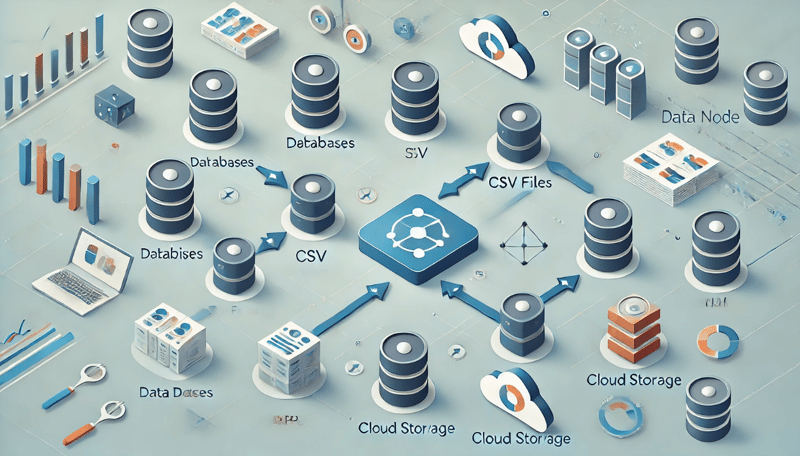No matter how complex your data problem is, you can always Divide & Conquer it. ???
In this article, we’ll break down how to solve intricate data challenges, data treatment, data management using a fully open-source Python library: Taipy. Whether you're cleaning data, orchestrating tasks, or exploring different outcomes, Taipy's intuitive design empowers you to handle it all.

Star Taipy ⭐️
Taipy's Scenario Management basis
Let’s go through three steps to show how Taipy can help streamline your data workflow:
1. Data Integration: Get the Data You Need
Every AI, ML, and data-driven project starts with data, obviously!
And it’s rarely as simple as a single, clean dataset. In most cases, you'll be pulling data from databases, APIs, flat files, or other external sources, and sometimes, all in the same project. This is where Taipy's data integration comes in—gathering and unifying data from these different sources.
In Taipy, this process is simplified with a key abstraction: the Data Node.
A Data Node represents your data but doesn’t store it directly. Instead, it holds all the necessary metadata to read and write the actual data, whether it’s a CSV file, a database table, or even an API response.

Here’s a quick example of defining a Data Node for a CSV:
from taipy import Config
initial_dataset_cfg = Config.configure_data_node(id="initial_dataset",
storage_type="csv",
path="data/dataset.csv",
scope=Scope.GLOBAL)
With this abstraction, Taipy takes care of data management, allowing you to focus on transforming and processing your data.
2. Task Orchestration: What Are You Doing with All That Data?
Now that your data is in place, what do you do with it? In any data workflow, the next step involves defining tasks that process and transform the data. This is what we call the Task Orchestration
A Task in Taipy is like a function, taking Data Node(s) as inputs, performing transformations, and then outputting Data Node(s).

For instance, you may want to filter some data or calculate new metrics. Here's an example of creating a Task to calculate the sum of a column:
clean_data_task_cfg = Config.configure_task(id="clean_data",
function=clean_data,
input=initial_dataset_cfg,
output=cleaned_dataset_cfg,
skippable=True)
Once you've defined your tasks, you can arrange them into a pipeline to ensure the steps execute in the correct order. This lets you easily build workflows that transform data, build models, generate reports, and more.
3. What-If Analysis: Explore Different Scenarios
Once your data and workflows are set up, you can begin exploring different scenarios. This is where the What-if analysis comes into play.
A Scenario in Taipy represents a specific instance of a problem you’re trying to solve, allowing you to test different parameters and see how they impact your results. By adjusting input data or assumptions, you can model various scenarios without starting over from scratch.

Here's how you can define a Scenario in Taipy:
scenario_cfg = Config.configure_scenario(id="scenario", task_configs=[clean_data_task_cfg, predict_task_cfg,evaluate_task_cfg], frequency=Frequency.MONTHLY)
tp.Core().run()
my_first_scenario = create_and_run_scenario(dt.datetime(2021, 1, 25))
predictions = my_first_scenario.predictions.read()
print("Predictions\n", predictions)
This makes it easy to perform sensitivity analysis or optimize outcomes, all within the same framework. Want to test different discount rates on your sales model? Just create new scenarios, tweak the parameters, and rerun them.
Taipy vs. Other Pipeline Management Tools
You may be wondering, how does Taipy compare to other popular pipeline orchestration tools like Apache Airflow, Luigi, or Prefect? While those tools are great for managing task scheduling across distributed environments, Taipy stands out by focusing on Python simplicity, especially when it comes to scenario management and what-if analysis.
Airflow/Luigi/Prefect: Generally focus on orchestrating ETL processes, scheduling, and monitoring workflows.
Taipy: It not only provides workflow orchestration but also simplifies what-if analysis with its unique scenario abstraction, allowing you to model various outcomes seamlessly.

For developers looking to handle complex data workflows in Python with minimal setup, Taipy offers a more straightforward, code-first approach.
Conclusion: Divide and Conquer with Taipy
The Divide and Conquer strategy wins every time, no matter the size or complexity of your data problems! With Taipy, you can handle everything from data integration to task orchestration and what-if analysis, all in one place. And you can finalize with data visualization as well.
Ready to give Taipy a try? Check out the GitHub repo and see how it can streamline your data workflows today!
Star Taipy ⭐️
Don’t forget to leave a star ⭐ and share your feedback or scenarios you've worked on in the comments below!
以上是What-if I told you complex Data Integration makes good Task Orchestration?的详细内容。更多信息请关注PHP中文网其他相关文章!
 Python vs.C:申请和用例Apr 12, 2025 am 12:01 AM
Python vs.C:申请和用例Apr 12, 2025 am 12:01 AMPython适合数据科学、Web开发和自动化任务,而C 适用于系统编程、游戏开发和嵌入式系统。 Python以简洁和强大的生态系统着称,C 则以高性能和底层控制能力闻名。
 2小时的Python计划:一种现实的方法Apr 11, 2025 am 12:04 AM
2小时的Python计划:一种现实的方法Apr 11, 2025 am 12:04 AM2小时内可以学会Python的基本编程概念和技能。1.学习变量和数据类型,2.掌握控制流(条件语句和循环),3.理解函数的定义和使用,4.通过简单示例和代码片段快速上手Python编程。
 Python:探索其主要应用程序Apr 10, 2025 am 09:41 AM
Python:探索其主要应用程序Apr 10, 2025 am 09:41 AMPython在web开发、数据科学、机器学习、自动化和脚本编写等领域有广泛应用。1)在web开发中,Django和Flask框架简化了开发过程。2)数据科学和机器学习领域,NumPy、Pandas、Scikit-learn和TensorFlow库提供了强大支持。3)自动化和脚本编写方面,Python适用于自动化测试和系统管理等任务。
 您可以在2小时内学到多少python?Apr 09, 2025 pm 04:33 PM
您可以在2小时内学到多少python?Apr 09, 2025 pm 04:33 PM两小时内可以学到Python的基础知识。1.学习变量和数据类型,2.掌握控制结构如if语句和循环,3.了解函数的定义和使用。这些将帮助你开始编写简单的Python程序。
 如何在10小时内通过项目和问题驱动的方式教计算机小白编程基础?Apr 02, 2025 am 07:18 AM
如何在10小时内通过项目和问题驱动的方式教计算机小白编程基础?Apr 02, 2025 am 07:18 AM如何在10小时内教计算机小白编程基础?如果你只有10个小时来教计算机小白一些编程知识,你会选择教些什么�...
 如何在使用 Fiddler Everywhere 进行中间人读取时避免被浏览器检测到?Apr 02, 2025 am 07:15 AM
如何在使用 Fiddler Everywhere 进行中间人读取时避免被浏览器检测到?Apr 02, 2025 am 07:15 AM使用FiddlerEverywhere进行中间人读取时如何避免被检测到当你使用FiddlerEverywhere...
 Python 3.6加载Pickle文件报错"__builtin__"模块未找到怎么办?Apr 02, 2025 am 07:12 AM
Python 3.6加载Pickle文件报错"__builtin__"模块未找到怎么办?Apr 02, 2025 am 07:12 AMPython3.6环境下加载Pickle文件报错:ModuleNotFoundError:Nomodulenamed...
 如何提高jieba分词在景区评论分析中的准确性?Apr 02, 2025 am 07:09 AM
如何提高jieba分词在景区评论分析中的准确性?Apr 02, 2025 am 07:09 AM如何解决jieba分词在景区评论分析中的问题?当我们在进行景区评论分析时,往往会使用jieba分词工具来处理文�...


热AI工具

Undresser.AI Undress
人工智能驱动的应用程序,用于创建逼真的裸体照片

AI Clothes Remover
用于从照片中去除衣服的在线人工智能工具。

Undress AI Tool
免费脱衣服图片

Clothoff.io
AI脱衣机

AI Hentai Generator
免费生成ai无尽的。

热门文章

热工具

SublimeText3 Mac版
神级代码编辑软件(SublimeText3)

DVWA
Damn Vulnerable Web App (DVWA) 是一个PHP/MySQL的Web应用程序,非常容易受到攻击。它的主要目标是成为安全专业人员在合法环境中测试自己的技能和工具的辅助工具,帮助Web开发人员更好地理解保护Web应用程序的过程,并帮助教师/学生在课堂环境中教授/学习Web应用程序安全。DVWA的目标是通过简单直接的界面练习一些最常见的Web漏洞,难度各不相同。请注意,该软件中

SublimeText3汉化版
中文版,非常好用

mPDF
mPDF是一个PHP库,可以从UTF-8编码的HTML生成PDF文件。原作者Ian Back编写mPDF以从他的网站上“即时”输出PDF文件,并处理不同的语言。与原始脚本如HTML2FPDF相比,它的速度较慢,并且在使用Unicode字体时生成的文件较大,但支持CSS样式等,并进行了大量增强。支持几乎所有语言,包括RTL(阿拉伯语和希伯来语)和CJK(中日韩)。支持嵌套的块级元素(如P、DIV),

EditPlus 中文破解版
体积小,语法高亮,不支持代码提示功能





